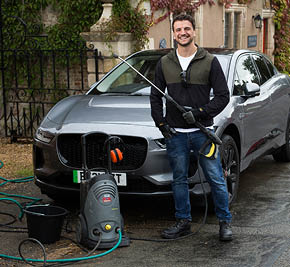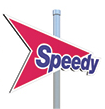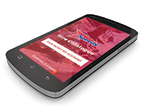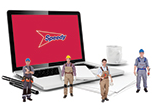
Pressure Washer Buying Guide
Pressure washers are a great way to get rid of dirt. They use a powerful jet of water to blast grime, moss, and mud away from outdoor surfaces, limiting the need for chemicals and cleaning products.
But if you’re in the market to buy or hire a pressure washer, you’ll probably see that there are hundreds of models out there. From hot and cold water pressure washers to various attachments and the amount of pressure pushed out, which is best for the job at hand?
Hiring your pressure washer means you can select the best option for the job, whatever you’re doing. To help you decide which to choose, read Speedy’s guide below.
CREATE A SPEEDY ACCOUNT TO START HIRING TODAY
Which Pressure Washer Do I Need?
Before using a pressure washer, ensure you’re wearing the correct PPE. A dust mask, eye protection, gloves and work boots are essential, and any PPE required can be purchased from Speedy alongside your hire.
There are a few key things to think about when choosing the best pressure washer:
- The pressure of the water (measured in Bars)
- What you are cleaning
- The water flow (litres per hour)
- Whether it uses hot or cold water to clean
- What is the power source?
- Pressure Rate
The higher the Bar, the more pressure the washer cleans with. The more pressure, the better it is for cleaning stubborn dirt, in general.
Light-duty pressure washers (up to 100 Bar) are great for surfaces which could be damaged by a stronger force, such as cars, decking, fencing, and garden furniture.
Medium-duty pressure washers (110-130 Bar) are ideal for patios, driveways, walls, and other more substantial surfaces.
Heavy-duty pressure washers (130+ Bar) should be used on substantial surfaces which are in good condition and are dirty with tough grime. Think of a path covered in moss and algae or a driveway covered in oil spills.
Don’t use pressure washers on fragile surfaces such as brick or glass.
The pressure can often be turned down on heavier-duty pressure washers, so you can do more with them. But for most tasks, light to medium duty will be enough and are cheaper to hire.
- Water Flow Rate
The water flow rate signifies the amount of water expelled in a given time (often measured in litres per hour). The higher the flow rate, the less time you will spend going over the same surface.
This can be particularly handy if you’ll be rinsing furniture or cars with the pressure washer.
- Hot or Cold Water?
Hot water pressure washers are generally seen as better for really tough cleaning tasks, such as oil and grease removal. This could be needed in areas with cars and other vehicles, or after renovation works.
The heat can also help if an area needs to be sterile.
But cold water pressure washers will often more than suffice for general cleaning duties in gardens and other outdoor areas.
- Power Source
Pressure washers can be petrol, diesel, or electric.
The former two are often more powerful. These can be used in industrial cleaning jobs, on job sites and in construction for instance. But they’re louder, heavier, and emit fumes.
If you do opt for petrol power, consider the noise level (dB), and remember to wear ear protection when working with petrol tools.
Electric is likely the best option for home and DIY users. It is easier to set up, less messy, and there isn’t the risk of fumes or refuelling to contend with.
Watch our video on How to Use a Pressure Washer:
Additional Features of Pressure Washers
Once you have all of the technical specifications above sorted, you need to look at any additional features of pressure washers which could make your life and the job at hand easier and smoother.
- Hose Length
This is the hose situated between the trigger gun and the main washer unit. Think about how large the area you need to clean is and how far away it will be from your outside tap.
Long hoses will give you more reach and allow you to cover more area without moving your set-up.
- Pressure Washer Accessories
If you’re cleaning a large patio area, you might want a pressure washer which is compatible with a patio cleaning kit. Wash brush attachments can help if you’re cleaning wheels on bikes or cars.
Some pressure washers can use detergent tanks, either pre-filled or with empty bottles which you fill with your chosen cleaning detergent. This can be handy if cleaning the car, or specialist stonework and masonry.
- Wheels & Handle
Will you be on the move a lot with your pressure washer? Electric pressure washers aren’t often heavy but having wheels and a handle will help you out.
They’re a must-have on heavier, petrol-powered pressure washers.
- Auto Start/Stop
Pressure washers will have a switch on the main unit to turn them off and on. Models with auto start/stop will also have triggers on the trigger gun which are pressed to allow the water flow. This can help if you need to pause for a few seconds to reposition when cleaning, as you don’t have to walk to the unit.
CREATE A SPEEDY ACCOUNT TO HIRE TODAY
Speedy has more than 200 local service centres across the nation, hire counters in selected B&Qs and nationwide 4-hour delivery. It has never been easier to hire the tools and equipment you need, including pressure washers.
You’ll find all the tools you need right here. Why not open a Speedy account today online or visit us in your local depot to start hiring today?
- 2024
- 2023
- December 2023 (13)
- November 2023 (9)
- October 2023 (7)
- September 2023 (10)
- August 2023 (20)
- July 2023 (21)
- June 2023 (17)
- May 2023 (17)
- April 2023 (17)
- March 2023 (14)
- February 2023 (15)
- January 2023 (7)
- 2022
- December 2022 (6)
- November 2022 (12)
- October 2022 (24)
- September 2022 (14)
- August 2022 (12)
- July 2022 (15)
- June 2022 (18)
- May 2022 (14)
- April 2022 (9)
- March 2022 (5)
- February 2022 (5)
- January 2022 (2)
- 2021
- December 2021 (7)
- November 2021 (10)
- October 2021 (1)
- September 2021 (1)
- August 2021 (3)
- July 2021 (3)
- June 2021 (4)
- May 2021 (1)
- April 2021 (1)
- March 2021 (2)
- February 2021 (1)
- January 2021 (1)
- 2020
- 2019
- 2017
- 2016
- 2014
- 2013
- 2012
- 2011


